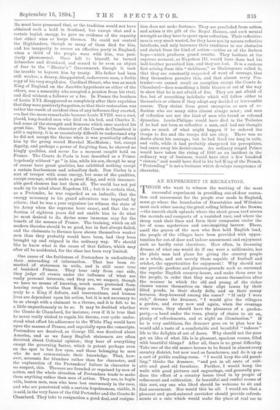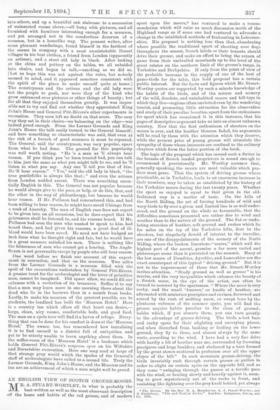AN EXPERIMENT IN RECREATION. T HOSE who want to witness the
working of the most successful experiment in providing out-of-door recrea- tion and amusement for the people ever made in England, must go where the boundaries of Dorsetshire and Wiltshire meet each other among the great rolling billows of the Downs, —the smooth chalk uplands where the short green turf covers the mounds and ramparts of a vanished race, and where the sheep rank their lines and form their companies under the lee of some mysterious and awe-inspiring barrow. There, amid the graves of the men who first held English land, the people of the villages have been provided with oppor- tunities for out-otdoor and indoor amusement and enjoyment such as hardly exist elsewhere. How often, in dreaming dreams of what one would do if one were a millionaire, has the plain man laid plans for giving the country people as a whole, and not merely those capable of football and cricket, the opportunities for enjoyment ! Why should not one provide gardens and pleasure-grounds such as surround the regular English country-house, and make them over to the people, in order that they may amuse themselves after the manner in which the old and young of the richer classes amuse themselves on their clipt lawns by their lilied ponds, in their shady dells, and on their sunny terraces, deep-bowered among the roses P " If only I were rich," dreams the dreamer, " I would give the villagers a garden, and every now and again, when the evenings were warm, they should have the pleasures of a garden- party, —a band under the trees, plenty of chairs to sit on, plenty of refreshments, and at night an illumination." If he is very ambitious, the dreamer goes on to plan how he would add a taste of a comfortable and beautiful " indoors " life to the delights of out of doors. Why should not the poor get an idea of what life is in pleasant, spacious rooms, filled with beautiful things P After all, there is no great difficulty. Take one of the old manor-houses to be found in almost every country district, but now used as farmhouses, and do it up as a sort of public reading-room. " I would keep the old panel. ling," thinks the dreamer, " and put in all sorts of suit- able and good old furniture. Farther, I would hang the walls with good pictures and engravings, and generally pro- duce the effect of a country house lived in by people of refinement and cultivation. In beautiful and restful rooms of this sort, any one who liked should be welcome to sit and find amusement. Nor would this be all. I would see that a pleasant and good-natured caretaker should provide refresh- ments at a rate which would make the place of real use to the people. The old manor-house should be an ideal club where the least impressionable villager might rest in a home of ancient peace, and where he or she, if capable of higher enjoyment, should learn to get the pleasures that are to be got from beautiful things." When he has got thus far, the dreamer usually awakes with a start, and asks, with a sigh, what is the good of such fantasies. Even if he had the money, be would not be able to carry them out, as such things always turn out a failure, and the people refuse to use them.
Well, dreamers of the kind we have named may take heart again. General Pitt-Rivers, at the Larmer Grounds, Rush- more, in King John's House, and in the Museum at Farn- ham, Dorset, has not only exactly realised the dream of recreation we have described, but has made it a complete and popular success. He has given the people a garden in which they take their pleasure in sun and shadow as if they were foreigners and not English people. He has thrown open to them a beautiful old manor-house hung with pictures and filled with exquisite old oak furniture, in which they may take their tea and their ease as if they were at home, and he has arranged for them a museum in which they may read in the clearest and most intelligible way bow lived the men of the old world,—the men who furrowed the Downs so deep with their ditches and laid their dead beneath the barrows on the wind-swept ridges of the chalk. Nothing could be prettier or more suitable for their purpose than the Larmer Grounds. The Larmer Tree—a very ancient land- mark and trysting-place—stands in an inclosed part of the Downs in the middle of a thick nut-grove,--a nut-grove, how- ever, in which grow a good many timber-trees. In this nut- grove and with the shell of the old tree as a centre of senti- ment, General Pitt-Rivers, the owner of the land, has made what is best described as a sublimated tea-garden,--a tea- garden in its attractiveness to the plain man, and yet with none of the vulgarity and stupidity of the ordinary tea-garden. It was a wise and happy thought thus to conform to the habit of the people and to give them what they are known to choose for themselves, but carried to perfection, rather than something which they ought to like on abstract prin- oiples. Had other would-be entertainers of the people adopted General Pitt-Rivers's plan, they had not erred so grossly in the art of recreation. When you enter the Larmer Grounds you come upon a wide expanse of exquisite green- sward set round with trees and bushes,—a wide clearing, as it were, in the original nut-grove. Facing you at the bottom of the lawn, is a rustic band-stand with a shingled roof. On the left is an exquisitely designed octagonal. temple in white stone,—a building which will delight those who think archi- tecture, and especially classical architecture, has its place in the garden. Near the little temple is a miniature bronze statue by Sir Edgar. Boehm, representing an ancient British hunter on his wig little horse, spear in hand. It is a charming piece of work, and exactly suited to the genius loci; for bow often must the primitive huntsman on his forest pony have passed the spot ! Murmuring your thanks to the artist " who did not work so earnestly at all times, and has else sus- tained some wrong," you note on your left a delightful dell with a pond at tue bottom full of water-lilies. The dell was originally a sand-pit ; but the art of the gardener has made it a well of greenery over which a yew-tree spreads its branches and black-green shade. On the lawn are plenty of green seats and chairs scattered as in Hyde Park. But General Pitt- Rivers has not been so unwise as to ignore the love of arbours implanted by Nature in the ordinary Englishman. What were a day's pleasuring without an arbour to have tea in P All round the central green there are lesser greens—side chapels in the temple of outdoor enjoyment—communicating with it by paths. Each lesser green is carefully planted round so as to secure seclusion, and has in it a pretty thatched arbour in case of wet. Here a party can make itself merry all alone and without fear of being overlooked. There are six of these arbours, called "quarters." Each has its special name. There is "Owl's Quarter," " Cat's Quarter," "Stag's Quarter," "Hog's Quarter," "Hound's Quarter," and "Yak's Quarter." Men and maids may thus give each other trysts without fear of mistake. The arrangement may also be put to more prosaic uses. Those who want to arrange a picnic beforehand may write to the caretaker and engage a favourite quarter. We must not forget the sinuous walks which lead about the ancient nut-grove, the glimpses of landscape, to obtain which artful cuttings have been made, or the skittle-alley and the swings. Nothing could be more practical, and nothing in better taste than all the arrangements. A word about the baud. They are all Dorsetehire and Wiltshire labourers, but they play with a will, and it is pleasant to see the wholesome country faces and frank blue eyes looking out over the edge of the cornet or the flute to catch a sight of friends on the lawn. They are dressed in a uniform which adds to the charm of the scene,—it is the costume of the old chase-keepers (the Larmer Tree stands in an ancient chase), and makes an admirable dress for a country band. People may bring their own refreshments, and if they do, every facility is given them in the way of cooking apparatus. " Two cooking-stoves with cooking-utensils, methylated spirits, and the other necessaries, are provided by General Pitt-Rivers, but the parties must bring their own cooks,"—so says the notice in the guide- book. Besides, refreshments can be bought at the care- taker's, and if people are wise they will get them there. The present writer has drunk tea in many places, but the break- fast-cup of Larmer tea, price one penny, eclipses anything he has ever seen elsewhere. As generous is the penny slice of cake and " the three slices of bread-and-butter for a penny." On the bright Sunday which ushered in September, a prettier and pleasanter sight could not have been found in England than the Larmer Grounds. The sun was shining, the band playing, and all the seats were filled with happy people. It is said that English people of the poorer classes will not sit at little tables in the open air and drink tea listening to music. But with his natural eyes on September let, 1894, the present writer saw this miracle. Indeed he may say Parva pars f ad, for did he not sit next a pleasant old lady in a black bonnet and drink tea and smoke a cheroot in the sun listening the while to the Larmer Band? Whatever is the reason, the people appreciate the Larmer Grounds. Though they are far from any large villages, the people come in hun- dreds, and when they are there enjoy themselves thoroughly. There is no restraint, no lack of freedom. Though every one is well behaved, no one is on his good behaviour. General Pitt-Rivers clearly understands the people for whom he provides, and has not made them shy with patronage or weary with fussiness. There are not many notice-boards in the Larmer Grounds, but one of them deserves mention for its straightforward good sense. The people are informed that as the grounds are intended for recreation, no speeches of any kind will be allowed. The caretaker, it is significantly added, will see that this is attended to. Men less really in sympathy with the people might have imagined that it would seem harsh and tyrannical not to let loose the public speaker. General Pitt- Rivers is, we feel quite sure, right to be stern. The people get quite enough preached at by the politicians and lecturers at large, and welcome a haven where they are not compelled to endure speechifying. We confess we should like to see the caretaker pulling an orator off one of the green benches, telling him, after Cromwell's manner, that his conduct was "very offensive and unedifying," and asking him "to cease his fooling and come down."
One must not write of the Larmer Grounds alone, and forget King John's House. Five or six minutes' walk from these, and in the village of Tollard Royal, a village set in a long deep wrinkle in the Downs, stands close to the church a little old manor-house. Some of the building dates back to the thirteenth century, but what you see is Tudor. This old house has been restored with good sense and good taste, and converted into a pleasure-house for the village. Let us describe it as it looked on the first Sunday in the pre- mit mouth. One pushes open the door in a quaint old porch, and finds oneself in a wainscoted room, hung with Italian and German pictures, and furnished with old furniture. The pic- tures are not great masterpieces, but bright and pleasant to look at, and far better than what pass as Old Masters in many rich men's houses. They are arranged to illustrate the history of painting from the earliest up to modern times. One Italian picture, a Madonna and Child of the school of Luini, if we re- member rightly, is a beautiful work. Nor are the great names altogether absent. A Giovanni Bellini is among the treasures of King John's House. The room has a good-sized party of people in it. Some are seated at a long table having tea, others are looking at the pictures, or resting in the chairs not too antique to be comfortable. Prom the first room one wanders into others, and up a beautiful oak staircase to a succession of wainscoted rooms above,—all hung with pictures, and all furnished with furniture interesting enough for a museum, and yet arranged not in the comfortless decorum of a museum, but in a homelike way. The present writer, after some pleasant wanderings, found himself in the farthest of the rooms in company with a moat unmistakable Dorset villager in his best clothes, a friend from London (apparently an artisan), and a stout old lady in black. After looking at the china and pottery on the tables, we all subsided into chairs, and began to talk,—smoking as we did so. [Let us hope this was not against the rules, but nobody seemed to mind, and it appeared somehow consistent with the spirit of the place to make oneself quite at home.] The countryman and the artisan and the old lady were not the people to gush, nor were they of the kind who grow entranced over pictures or other things of beauty ; but for all that they enjoyed themselves greatly. It was impos- sible not to try and find out whether they appreciated King John's House and General Pitt-Rivers's other experiments in recreation. They soon left no doubt on that snore. The easy way they eat in their chairs—no balancing on the edge—was indeed proof enough. From the Larmer Grounds and King John's House the talk easily turned to the General himself; and here something so characteristic was said, that even at the risk of a breach of good manners it must be repeated. The General, said the countryman, was very popular, apart from what he had done. The ground for this popularity was well worth noting. " He 'a a man as '11 always hear reason. If you think you 'ye been treated bad, you can talk to him just the same as what you might talk to me, and he '11 listen to what you say. Any one '11 tell you that of him. He '11 hear reason." " Yes," said the old lady in black, " the true gentlefolks is always like that ; " and even the artisan from London nodded assent. There was something essen- tially English in this. The General was not popular because he would always give to the poor, or help, or do this, that, and the other in the way of philanthropy, but because he would hear reason. If Mr. Pullman had remembered this, and had been willing to hear reason, he might have saved Chicago from a week of Anarchy. The man of English race does not expect to be given into on all occasions, but he does expect that his grievances shall be listened to, and his reasons heard. If Mr. Pullman had seen the men who wanted to speak to him, had heard them, and had given his reasons, a great deal of ill- blood would have been saved. He need not have budged an inch from what he thought right and fair, but he would have in a great measure satisfied his men. There is nothing like the bitterness of men who cannot get a hearing. The Anglo- Saxon is not governable except by people who will hear reason.
One word before we finish our account of this experi- ment in recreation, and that on the museum. Two miles from the Larmer Grounds is a museum filled with the spoil of the excavations undertaken by General Pitt-Rivers. A. greater treat for the archaeologist and the lover of primitive man, cannot be imagined. Did space allow, we could fill our columns with a recitation of its treasures. Suffice it to say that a man may learn more in one morning there about the dead who lie in the barrows than in a month from books. Lastly, to make his museum of the greatest possible use to students, the landlord has built the ' Museum Hotel.' Here is a country inn which offers all that heart can desire,— large, clean, airy rooms, comfortable beds, and good food. The man on a cycle tour will find it a haven of refuge. Every- thing that can be done for his comfort is done at the ' Museum Hotel.' The owner, too, has remembered how tantalising it is to find oneself in a district full of antiquities, and yet to be utterly unable to learn anything about them. In the coffee-room of the ' Museum Hotel' is a bookcase which holds General Pitt-Rivers's magnum opus on his Wiltshire and Dorsetshire excavation. Here one may read at large of that strange grey world which the spades of the General's staff of arcbreologists have called to a second life. Truly the Larmer Grounds, King John's House, and the Museum and its inn are an achievement of which a man might well be proud.




































 Previous page
Previous page